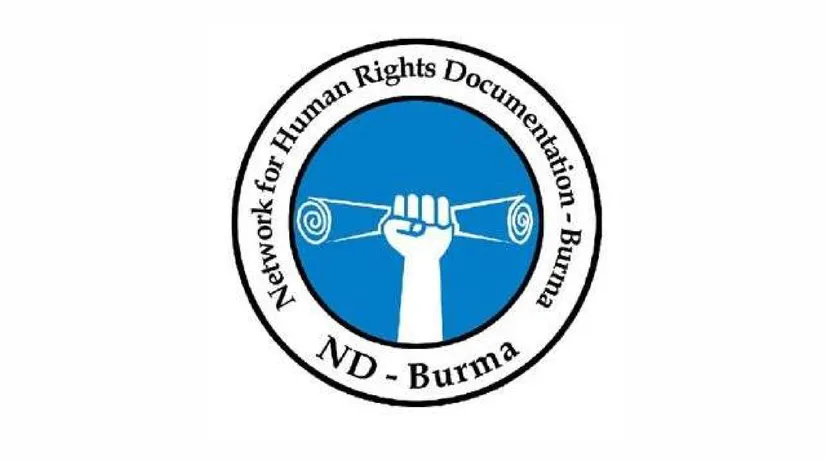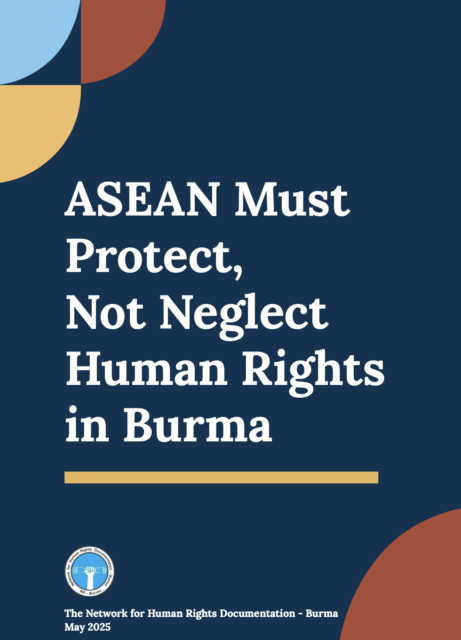ASEAN Must Protect, Not Neglect Human Rights in Burma


Ahead of the 46th ASEAN Summit to be held from 26-27 May 2025, members of the Network for Human Rights Documentation – Burma (ND-Burma) are concerned about the ongoing failure of regional leaders to hold the military junta accountable for its widespread and systematic crimes against civilians.
The upcoming gathering of ASEAN officials and dialogue partners presents an opportunity to heed the calls of civil society organizations, which have urged decisive and firm action to the worsening human rights, humanitarian, and political crisis in Burma following the February 2021 attempted military coup.
The failure of ASEAN thus far to adequately address the multiple challenges in Burma has undermined its credibility in promoting peace and democracy, with innocent civilians suffering the most as they are forced to bear the burden of war.
The situation in Burma has worsened, with over three million displaced and declining donor support placing additional strain on local people. Even after the earthquake at the end of March 2025, the junta has not adhered to its ceasefire and continues to attack communities from the air and ground. The lack of attention and action by ASEAN
has led to the ongoing persecution of ethnic people, including the Rohingya, who are at a risk of heightened atrocities being committed against them.
Moreover, frontline defenders, including ethnic health providers, women human rights defenders, and journalists, have faced targeting by the military in a lethal and coordinated campaign to suppress dissent. Since the failed coup, ASEAN has been chaired by Brunei, Cambodia, Indonesia, Laos, and, most recently, Malaysia, which took on the role with the theme of ‘Inclusivity and Sustainability.’ Despite efforts such as the Five-Point Consensus, which ASEAN has refused to reform or challenge the junta on its obligations, the regional bloc has consistently failed to hold the regime accountable to achieve lasting change in Burma.
In 2023, Malaysian Foreign Minister Zambry Abdul Kadir called for for “strong” actions against the military General, mentioning that the “obstacles” they have posed have hindered efforts to implement a plan for restoring peace.
Yet, in its current Chairmanship, these remarks appear contradictory given the engagement the Malaysian Prime Minister has initiated, including meetings with the coup leader, which undermines this very precedent. Ahead of which, civil society, the National Unity Government and Ethnic Revolutionary Organizations expressed ‘grave concern’ over these engagements, stating: “Any unilateral engagement with the military- leader- widely regarded as a terrorist- must be approached with utmost caution.”Furthermore, this process must take place in a genuine and inclusive way, led and owned by Myanmar approach. No ASEAN leadership has managed to confront the crisis for what it is—a devastating unravelling of human rights and freedoms at the helm of an authoritarian regime fueled by power-hungry dictators.
In accordance with the UN Security Council’s Resolution 2669, adopted on December 21, 2022, violence in Burma must end immediately. The resolution also calls for the release of unlawfully detained political prisoners and urges the military to restore democratic institutions. Additionally, it emphasizes the need for concrete actions and reforms to implement the ASEAN Five-Point Consensus.
In the aftermath of ongoing foreign policy shortfalls, ASEAN must develop a new direction and strategy and fundamentally shift its priorities. This would establish a precedent that the junta is not above the law. Those in attendance must work together to advance human rights in line with calls from civil society and grassroots networks rather than appease the junta and risk legitimizing it on the global stage. Further, this short paper by ND-Burma will briefly assess the failed response by ASEAN in holding the junta accountable for its crimes against civilians throughout the country. It will also demand clear and moral leadership from ASEAN to refrain from negotiations with a terrorist regime and instead engage meaningfully with the leaders and supporters of the People’s Revolution.
Announcements
21 May 2025
Open letter: Malaysia must lead ASEAN with principle, not hypocrisy, to address the Myanmar crisis

Progressive Voice is a participatory rights-based policy research and advocacy organization rooted in civil society, that maintains strong networks and relationships with grassroots organizations and community-based organizations throughout Myanmar. It acts as a bridge to the international community and international policymakers by amplifying voices from the ground, and advocating for a rights-based policy narrative.